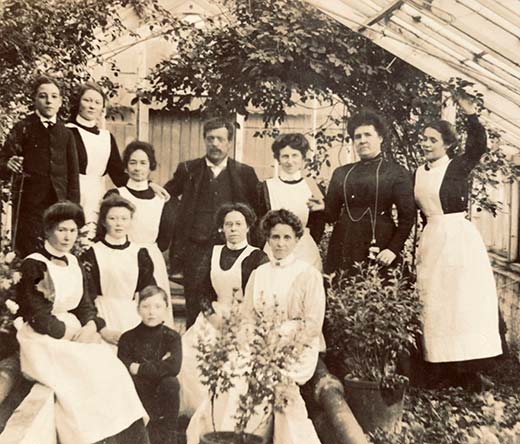Hebden Bridge Local History Society
Domestic Bliss: home and away in the 1900s
Speaker: Michael Peel
Saturday, 29 October 2022
In his recent talk to Hebden Bridge Local History Society, Michael Peel told a story of life upstairs and downstairs which was uncovered from a collection of more than 200 old postcards. The saleroom-find, back in the 1970s, had aroused his curiosity, but he had never quite turned the fragments of memories into a story. More recently, with access to archives such as those held by Hebden Bridge Local History Society and Pennine Horizons Digital Archive, as well as the ability to search online census records, births marriages and deaths as well as old newspapers, some of the story was ready to be told.
The collection had been made by Mary Hepworth and covered the optimistic period from 1900 up to the start of the First World War. Mary Hepworth, like many working class young women, had come to Hebden Bridge from a pit village near Barnsley to work as a domestic servant for one of the up and coming business families. At a time when postal services could be relied on to deliver next day, postcards were a valued way of communicating.
Fortunately for posterity, Mary's friend Ada was also a domestic servant in Hebden Bridge, and the two corresponded frequently by postcard. These make up the bulk of the collection. Mary probably kept the cards because of the pictures of seaside places and beauty spots, but a century later it is the written messages that fascinate us.
This was a period of economic growth in Hebden Bridge, with shopkeepers becoming more wealthy. Mary's story centres on two prominent families. Photos of the period show two adjacent businesses at the centre of town; the Greaves family had a draper's shop, and nearby was the ironmongers of the Chambers family. Joining together the family dynasties through marriage added to their business success, and they inevitable move up the hillside to so-called 'snob row' on Birchcliffe, where they were responsible for building a number of prestigious villas, such as Beechmount and Woodside. In these mansions on the hill, a middle class 'upstairs' life was established, depending on the invaluable maid servants 'downstairs.' These were often girls of 15 or 16, and often from places at some distance from Hebden Bridge.
In 1901, Mary Hepworth was working as maid servant for Thomas Barker Chambers and his wife Alice in a house called Woodside, built for the family. Next door lived Grace Greaves, his mother in law. Her servant Ada King, from the same village of Monk Bretton, was Mary's friend and correspondent. The second major source of interest is the batch of cards sent to Ada from her employers, when they went to visit seaside towns.

What is written is a fascinating mixture of the delights of Southport, Blackpool or Douglas and practical instructions such as the need to light fires, prepare a goose or forward socks and gloves. The tone of the cards suggest a rather affectionate relationship between maid and mistress. Photographs preserved in the collection also seem to show a relative social ease between the classes. One shows a mix of employers and servants in a large garden, clearly enjoying a celebration together.
Mary Hepworth's postcard collection also traces the progress of her romance with James Greenwood, the man she eventually married. (A not too subtle hint from Mary was a postcard illustrated with the name MARY, and a message 'hoping this will be the name of your bride'.) Again a degree of social ease is evident in her employer's knowing comments about their romance, and the assumption that Mary will be able to pass on instructions to James such as to collect them from the station when they returned from the seaside.
The collection captures Hebden Bridge at a time of civic and commercial growth, with leisure time for the middle classes whose work life continued down in town while they lived in style in the villas and mansions of Birchcliffe or visited the newly expanding tourist spots by the coast.
Michael's talk demonstrated to perfection the joy of discovery from archives, records and lovingly hoarded postcards.
The next meeting of Hebden Bridge Local History Society will hear from Emily Webb, lecturer at Leeds University, about the social history of Britain's favourite drink. Beneficial, injurious or innocent – Tea in 18th century Britain.
Details of the History Society talks programme, publications and of archive opening times are available on the History website and you can also follow History Society Facebook page.
With thanks to Sheila Graham for this report
See also: the HebWeb History section

